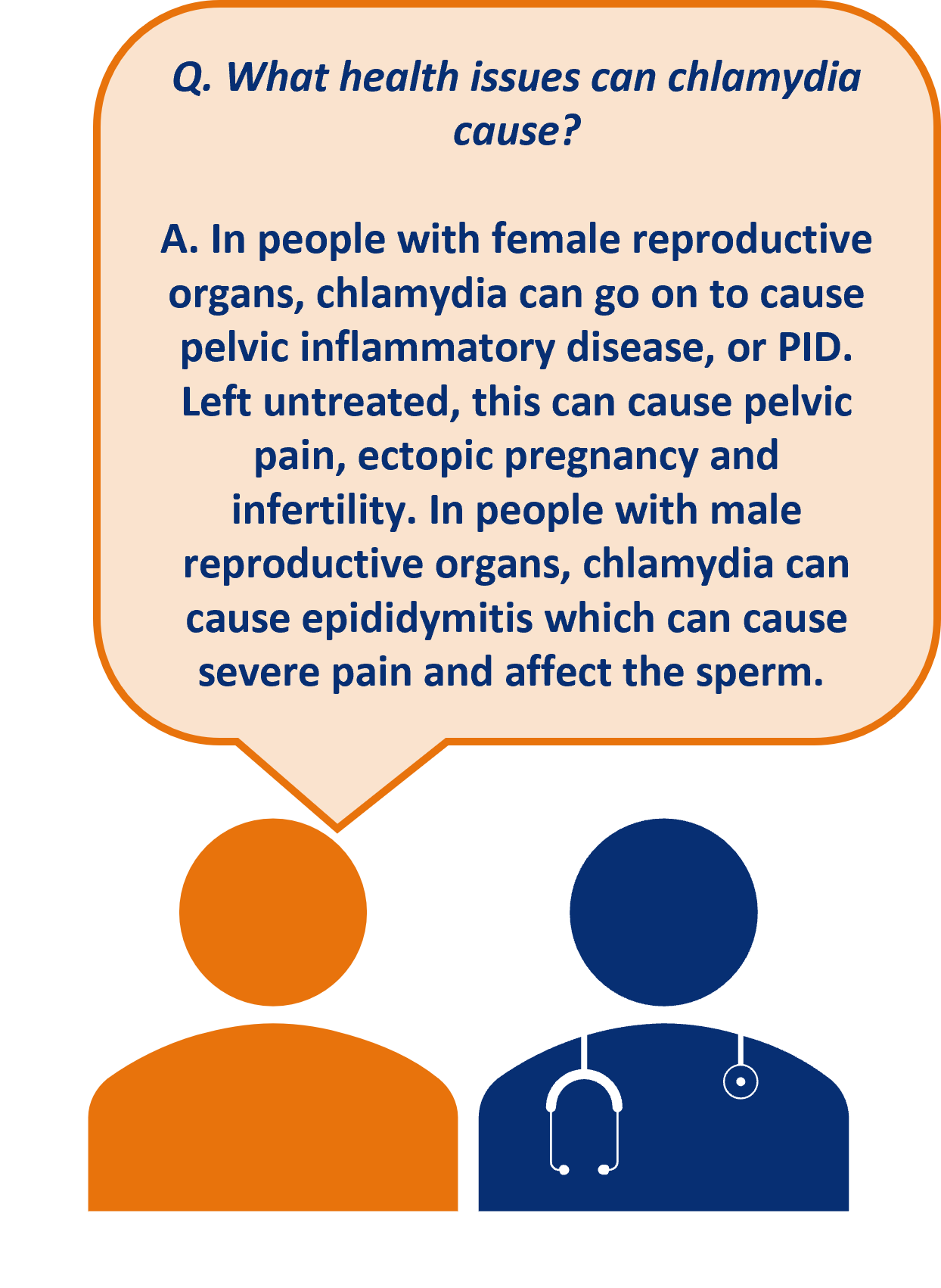
Pelvic Inflammatory Disease (PID)
Consider PID when chlamydia is diagnosed in a patient with female reproductive organs.
About PID
- Pelvic inflammatory disease (PID) is a clinical condition involving inflammation of one or more organs of the female upper genital tract (endometrium, fallopian tubes, ovaries, pelvic peritoneum) that generally occurs as an acute infection of less than 30 days duration.
- Clinical presentation varies widely in severity and symptoms, although patients commonly present with recent onset lower abdominal pain or dyspareunia.
- PID sequalae include tubal infertility, ectopic pregnancy and chronic pelvic pain.
- Treatment should be initated promptly to prevent sequalae.
- Chlamydia is the most commonly detected STI with PID.1 An estimated 15% of new chlamydia infections will progress to symptomatic PID if untreated.2
- Other STIs implicated include gonorrhoea and M. genitalium. In up to 70% of cases no organism is identified.
- Many people with PID will also have bacterial vaginosis.
Diagnosis
- PID is diagnosed clinically.
- Clinicians should have a low threshold for diagnosing PID in sexually active people <30 years presenting with recent onset pelvic or lower abdominal pain where no other cause is identified, and people diagnosed with an STI.
- It is essential to exclude life-threatening causes of acute pelvic and abdominal pain such as ectopic pregnancy or appendicitis.
- Clinicians should ask about new onset lower abdominal pain and/or dyspareunia in any patient with female reproductive organs attending for chlamydia or gonorrhoea treatment.
For help diagnosing PID, see:
- Common causes of low abdominal (pelvic) pain in women of reproductive age (PDF)
- Pelvic Inflammatory Disease diagnosis flowchart (PDF)
- Speculum and bimanual examination (PDF)
Management
- Antibiotic treatment should be initiated at the time a clinical diagnosis of PID is made and without waiting for STI test results.
- See the Australian STI Management Guidelines for recommended antibiotic regimens and other management considerations.
- A rapid response to treatment confirms a diagnosis of PID.
- Current sexual partners should be treated to cover chlamydia (and gonorrhoea if likely) irrespective of test results.3
Patient resources for PID
For a patient factsheet about PID, click below
For all patient resources, click below
General Practice resources for PID
Need more help?
Contact your local Family Planning organisation or specialist sexual health clinic for further support.
You can view an Australian Doctor article 'How to treat PID' and earn CPD points by taking the quiz. You will need to register (requires an AHPRA number) and logon to https://www.ausdoc.com.au/ or, if you are already registered/logged on,go to https://www.ausdoc.com.au/how-treat/pelvic-inflammatory-disease
For General Practice resources, click below
For our workflow resources click here.

Key guidelines for chlamydia case management
For PID diagnosis, treatment and management
Australian STI Management Guidelines
For guidance on acute abdominal pain in women, including differential diagnosis, speculum and bimanual examinations, and a PID flowchart
NSW Health STI Programs Unit (STIPU) Acute Abdominal Pain in Women
For guidance on contact tracing with PID
1. Goller JL, De Livera AM, Fairley CK, et al. Characteristics of pelvic inflammatory disease where no sexually transmitted infection is identified: a cross-sectional analysis of routinely collected sexual health clinic data. Sex Transm Infect. 2017;93(1):68. Available from: https://www.ncbi.nlm.nih.gov/pubmed/27091727
2. Price M J, Ades A, Soldan K, et al. The natural history of Chlamydia trachomatis infection in women: a multi parameter evidence synthesis. Health Technol Assess. 2016;20(22). Available from: https://www.ncbi.nlm.nih.gov/pubmed/27007215
3. Australasian Society for HIV Viral Hepatitis and Sexual Health Medicine. Australasian Contact Tracing Guidelines 2016 [updated 2020]. Available: http://contacttracing.ashm.org.au/conditions/when-contact-tracing-should-be-considered/pelvic-inflammatory-disease-pid








